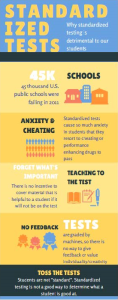By Tana Burkhart
Reporter
Standardized tests are no good for our students. Placing so much stock into standardized testing stunts creativity, causes schools to spend all their time trying to pass the test, and neglects to acknowledge that not every child is the same.
pass the test, and neglects to acknowledge that not every child is the same.
Many supporters of standardized testing will claim objectivity as the number one positive to holding on to the practice. Since the tests are all a similar set of questions graded by a machine, it does not give advantages to any one set of students.
Standardized tests don’t value creativity or diversity. Students who take these tests come from different cultural backgrounds, proficiencies, and different learning and thinking styles; yet standardized testing does not take any of those factors into account. Perhaps objectivity is the greatest weakness of standardized testing.
Since machines grade these tests, each student is treated as if they are identical. No one sees the creative answers a student may give, and this actually raises the chance of a wrong answer if the student does not follow the test format. While machines are objective, using them ignores the fact that there are, in fact, winners and losers in this world.
Students who excel at a certain subject may not receive acknowledgement for being proficient in the subject simply because they are not great test takers. These tests reduce human education to a data point.
“In my opinion, it takes a combination of measurements,” Helen Hale, Student Success Center Coordinator, “I like to see that a student can do at least mediocre to average on test scores, but that’s not the only thing to look at when discussing such things as course placement.”
Hale goes on to explain the steps Crowder College has implemented to combine test scores with GPA. She says she’s seen students who have over a 30 composite on the ACT, but do not possess the motivation to be in college, so they flunk out. There have also been students with lower ACT scores but higher determination that have become 4.0 students who have moved on to earn a four-year degree.
Many students feel so much pressure from teachers and the community, that there have been cases of cheating and taking performance enhancing drugs. As well as on the other side, since teachers know the test scores can affect their jobs, some have been known to cheat as well. These statistics can be seen on Freakonomics.
Ron Berler, journalist for the NTY and Chicago Tribune, believes we are doing way too much of this testing, and it has changed the way our children are educated. He says that from the beginning of the school year up until the midterm everything works as normal, but as soon as the students return from Christmas break all the studying comes from the standardized test prep book. Schools want students to pass so they will pass the scrutinizing test the government is giving them, because if they don’t, funding can suffer significantly.
In 2011 45 thousand public schools in America were failing and it was predicted that year that by the end of 2012, 82 percent of schools would be.
There is a comprehensive, nine-year study of testing that was commissioned by the National Academy of Sciences that concluded: “available evidence does not give strong support for the use of test-based incentives to improve education.”
If we want our students to have the motivation to succeed in life, and not lose heart in furthering their education, we need to toss standardized testing to the wayside. It is time to reevaluate how we are determining how well our students are doing. Student success cannot be based on objectivity alone.

Leave a Reply